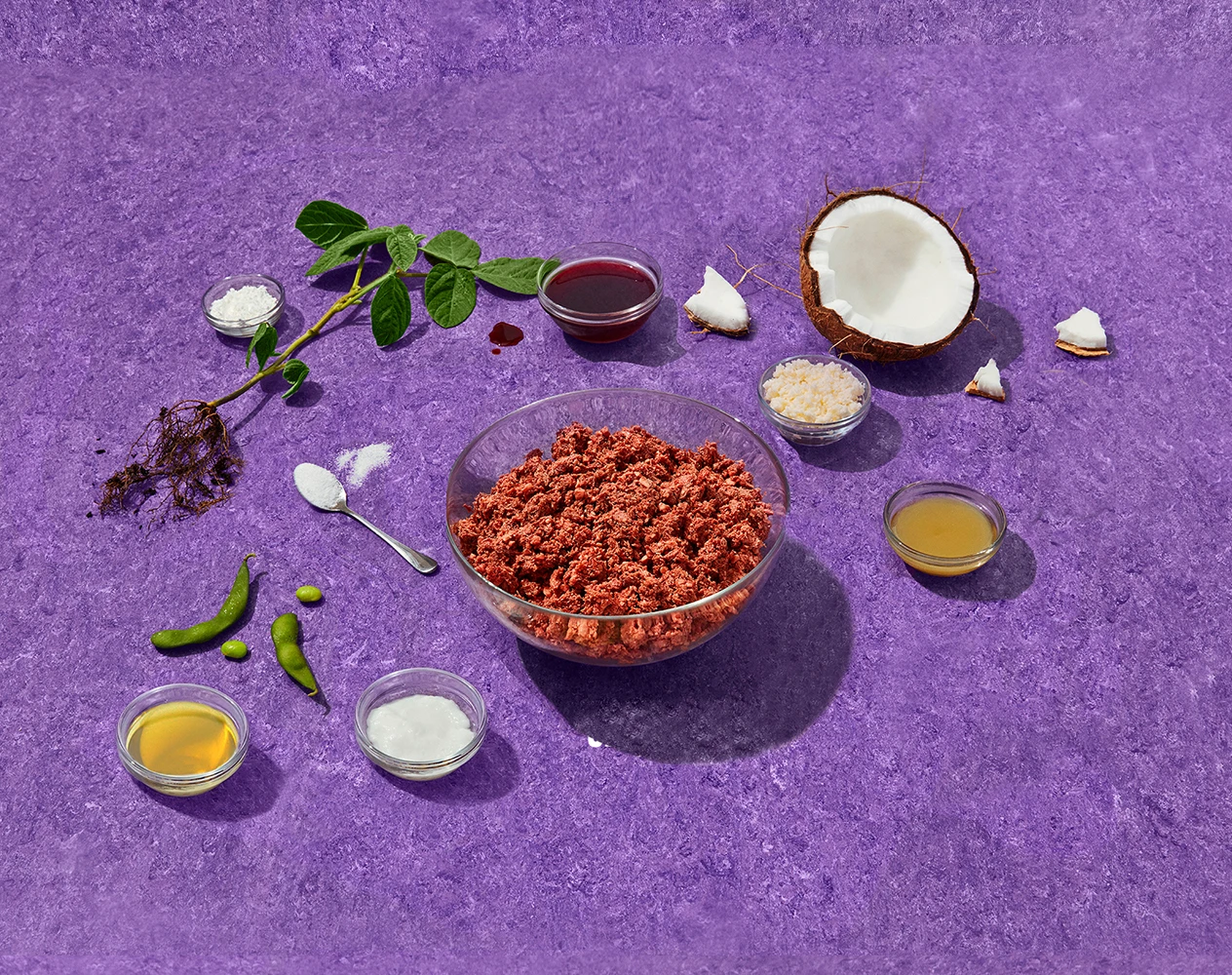Why We Use Soy in ImpossibleTM Beef
Debunking Common Myths About Soy Protein

Consumers everywhere are becoming more health-conscious. Demand for plant-based meats made with peas and soy is skyrocketing and even out-pacing sales growth of animal meat(opens in a new tab). Veggie patties are becoming a thing of the past as people turn to new alternatives that match the flavor and nutrition of the foods they love. With delicious products like Impossible™ Beef and Impossible™ Sausage Made From Plants, we're heralding a new era that we like to call Meat 2.0.
As consumption of plant-based foods increases, so does the spread of misinformation. Soybeans in particular have been a hot topic of discussion recently, but the reality is that these nutritional powerhouses have been consumed for centuries. Soy contains protein, fiber, vitamins and essential minerals, which is exactly why we include soy-derived ingredients in our products. Heme(opens in a new tab), the magic ingredient that makes our burgers cook and taste like meat, can be found in the root nodules of soybeans.
Keep reading to learn why we use soy and what the industry has to say regarding the most common myths and misconceptions about this powerful plant.
What is soy?
Soybeans were first farmed in China around 1100 BC(opens in a new tab) and spread to other Asian countries in the following centuries. In the U.S., soybean farming first appeared in the 1700s, but production didn’t accelerate until World War II. Today, soybeans are used in a number of foods, including soybean oil (the most common cooking oil(opens in a new tab) in the US), as well as tofu, tempeh, miso, edamame, soy milk, and more. The soybean is notable among plants for its “high quality” protein, and is the only commonly consumed plant protein that is comparable in quality to animal protein(opens in a new tab).
The soybean is notable among plants for its “high quality” protein, and is the only commonly consumed plant protein that is comparable in quality to animal protein.
Soy-derived products are used extensively in the food industry, helping to improve moisture retention and flavoring in everything from bread to tomato soup. Soy protein is also found in cereals, nutrition bars, and plant-based meats like the Impossible Beef.

Heme can be found in the root nodules of soy plants
We use American-grown, milled, and processed soy in our products because it’s an excellent source of high-quality protein with a long-established history of safe use in food. Soy plays a huge role in giving Impossible Beef and Impossible Sausage their meaty texture, excellent nutrition, and culinary versatility -- everything you’d want to see in meat made from plants. Soybeans also allow us to continue our mission to end the use of animals in food production by 2035.(opens in a new tab)
Combating the Common Myths Around Soy
Myth #1: Soy is linked to cancer
For years, there’s been a concern that soy may promote the growth of hormone-sensitive breast cancers. However, research shows that soy does not increase breast cancer risk. The American Institute for Cancer Research(opens in a new tab) states: “Soy protein powder or soy isoflavone supplements show no effect on markers of breast cancer risk such as hormone levels, markers of breast cell growth, or breast density, in randomized controlled clinical trials.” They added, “Population studies don’t link soy consumption with increased risk of any cancer.”
In fact, soy’s high isoflavone content could even offer some protection against cancer. In Asia, soy consumption is actually linked to a lower risk of breast cancer(opens in a new tab). Another study found that breast cancer patients who consume soy had 21% higher survival rates(opens in a new tab) over the course of nine years. "Soy-based foods are some of the best foods you can eat on the planet,(opens in a new tab)" says Jaclyn London, MS, RD, CDN to Good Housekeeping.com. "Soybeans provide a plant-based protein source; a slew of vitamins and minerals crucial for reducing risk of chronic disease; and fiber that helps you fill up and feel satisfied."
Myth #2: Soy stimulates breast growth in men
Similar to the misconception about breast cancer, there is a persistent myth that soy’s isoflavones cause hormonal issues and even breast tissue growth in men. Dr. Caroline Apovian, a professor of medicine in endocrinology, diabetes, nutrition, and weight management at Boston University School of Medicine, put it simply: “There’s no evidence to support this(opens in a new tab).”

This fear stems back to one 2008 case study(opens in a new tab) of a man who experienced breast tissue growth after drinking a whopping three-quarters of a gallon (12 servings) of soy milk a day. The case has since been criticized(opens in a new tab), noting that excessive consumption of nearly any food could have unwanted side effects.
Further research, including a meta-analysis of clinical data(opens in a new tab), found no link between soy consumption and feminization(opens in a new tab), low testosterone, or high estrogen levels in men.
Myth #3: Soy is genetically-modified, and therefore bad for your health
Genetic modification has existed for thousands of years; ancient farmers strengthened their crops through techniques like artificial selection and selective breeding. Today, advanced technology enables food suppliers to insert certain beneficial genes to create foods that are resistant to pesticides, drought, diseases, or pests. While the resulting plant’s DNA is slightly different, GM plants look and taste the same, and have the same (or even better) nutritional value as conventionally grown foods.(opens in a new tab)
94% of soybean crops(opens in a new tab) in the U.S. are genetically modified (GM). While some people have concerns about GM foods’ impact on health, research and regulators agree it is unfounded. Dietitians are even less likely than consumers to be worried about GMO products -- research shows only 12% of dietitians would recommend their clients avoid GMOs.*
ScientificAmerican.com(opens in a new tab) echoes this sentiment:
“The vast majority of the research on genetically modified crops suggests that they are safe to eat and that they have the potential to feed millions of people worldwide who currently go hungry.”
It’s likely that you’re already eating food made with ingredients that come from GMO crops(opens in a new tab) on a regular basis, such as cornstarch, canola oil or granulated sugar. Other popular genetically modified foods include fresh fruits and vegetables like potatoes, summer squash and apples. White rice, one of the world’s most widely consumed crops, is often modified in order to boost nutritional value and resist extreme environmental factors(opens in a new tab). There is no doubt that this is extremely helpful for people around the world who rely on rice as a main source of food.
Impossible Foods has always embraced the responsible, constructive use of genetic engineering. Learn more about why we use GM soy in our plant-based meats(opens in a new tab).
The Future is Plant-Based: The Benefits of Soy
Now that we’ve debunked the health concerns about soy, let’s talk about the benefits.

Soybeans are a great source of protein. Soy stands out among plant sources of protein not only because of its high protein quantity(opens in a new tab), but also due to the quality of the protein it contains. Unlike most other plant proteins, soy contains all essential amino acids in proportions needed to meet human protein requirements.
Soy is also a good source of fiber and essential minerals. Soybeans contain significant amounts of many B vitamins and vitamin K. Soybeans are naturally rich in calcium(opens in a new tab), an under-consumed nutrient in the US, and many soy foods like soy milk and tofu are also fortified with calcium. Soy also provides a variety of nutrients, including omega-3 fatty acids and fiber.
Health.com(opens in a new tab) reports:
“Some forms of soy are also healthy alternatives to animal proteins. (Animal sources of protein can have more heart-harming saturated fat than plant-based sources.) If eating more soy helps you displace some meat in your diet, great.”
Soy-based protein sources benefit the environment. Compared to beef from a cow, the Impossible Beef(opens in a new tab) uses 92% less water, emits 91% fewer greenhouse gases, contributes 92% less water pollution, and uses 96% less land — enabling healthy ecosystems to be restored for nature and biodiversity.
Soy protein, combined with heme, makes Impossible Beef taste delicious. 70% of consumers who have tried Impossible Beef say it tastes as good as ground beef***. Impossible Beef even sizzles like traditional meat𛲅, searing on the outside with a pink juicy center. It also provides the same amount of protein as a serving of 80/20 ground beef (19 g of protein per 4 oz serving).
The benefits of soy are clear
Soy’s versatility and nutrition have made it a popular food consumed by diners around the world. Unless you have a specific allergy or sensitivity to soy, there is no reason to avoid this food that is not only safe to eat, but has a number of health benefits.
Sources:
*Beef 2.5 Quant Study, March 2021 (N = 1,000)
**Jan 2021 IF Plant-Based State of Industry Research
*** In a home usage study, 70% of 254 US consumers who cooked with Impossible™ Beef thought the taste was comparable to or better than ground beef from cows
𛲅In a home usage study, 77% of 254 US consumers who cooked with Impossible™ Beef thought it sizzled like ground beef from cows.
